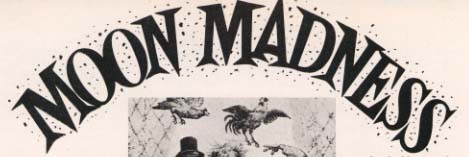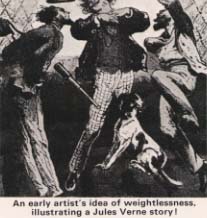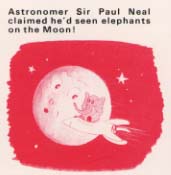Annual 1975

| Who saw elephants on the Moon? Why, Sir Paul Neal did! And when this 17th cen- tury astronomer told the world, it believed him! There were learned dis- cussions, arguments in this and that journal, and heated words at meetings of the Royal Society. But Neal insisted. He'd looked through his tele- scope, and there they were--or rather, there it was. One elephant. Big. Grey. Trotting around the craters as cool as you please. Why didn't Neil Arm- |
 |
can howl without getting a licking for it. Which dog-owner is going to get out of bed to wallop his hound in the middle of the night? It has sinister connota- tions, certainly. In Ire- land, a 'moon-lighter' is someone who goes out in the dead hours to do wanton damage--like burning ricks, and de- stroying farm-buildings. But that's only a throw- back to the days when Ireland was under the oppression of ruthless English landlords. In Australia, a 'moon- |
| strong find this elephant's descen- dants when he set foot on the Moon's surface? Not even a hoof- print, or a cast-off tusk? Because famous Sir Paul Neal had seen nothing more than a mouse. A mouse which had eaten its way into the body of his wooden- framed telescope to scutter around in his fascinated vision one night while he did his daily bit of star- gazing! In 1975, we can look back on Neal and laugh at his honest--but undeniably stupid mistake. And yet that Moon, the familiar old Moon that shows itself to us, weather permitting, night after night, has about it a whole aura of magic, mystery and folk-lore-- a wealth of legend much of which is still believed today. You'll still find, in farming communities, some old stagers who plant their crops according to the phase of the moon. As they used to put it--"Sow peas and beans in the wane of the Moon. Who soweth them sooner, he |
soweth too soon." And many are the mothers who will draw the curtains on a full-moon night so that the light of it doesn't shine on their sleeping children. For cen- turies, people have believed that the full moon's light induces blindness--or madness. The very word 'lunatic' stems from the Latin word for moon--and Julius Caesar and his pals must have shivered when they woke up to see that shining, round orb in the sky. It's unlucky to see the new moon through glass. A pity for anyone who wears spectacles! But you can throw off the bad luck by turning over all the coins in your pocket! The Moon has always been thought to be evil. Perhaps be- cause it occasionally eclipses the Sun. One can imagine the fear of our primitive ancestors when, so to speak, their heavenly light went out at mid-day! Dogs howl at the moon. Well, it's possibly because, in the depths of darkness, they |
lighter' is a sheep-rustler. Well, he wouldn't do it in broad daylight, would he? One nice legend concerning the moon is that of the West Country moonrakers. These gentlemen were smugglers, and contraband brought in from foreign ports would be sunk, temporarily, in handy lakes and ponds. Come midnight, the boyos would nip out and use fishing nets to drag for their ill-gotten gain. And when  |